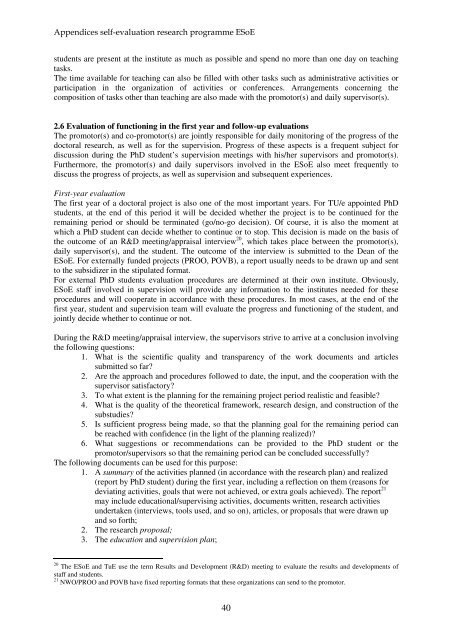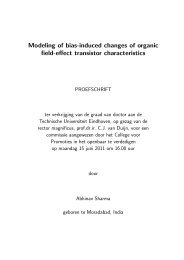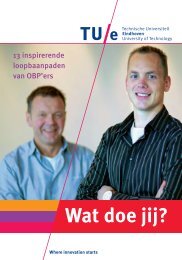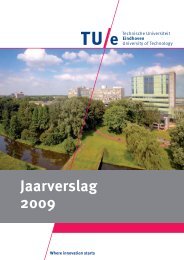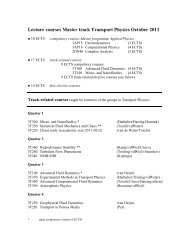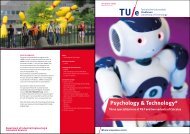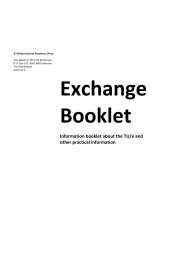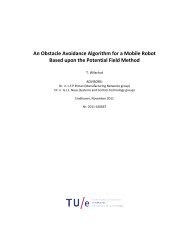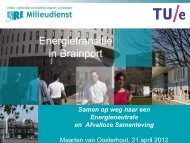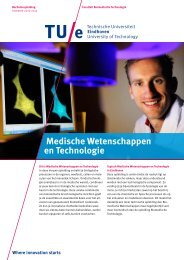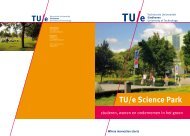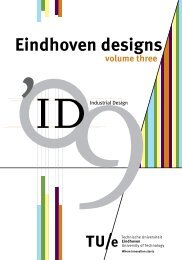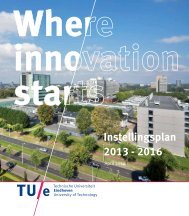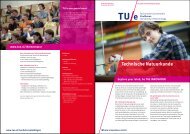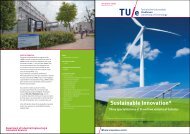Self-evaluation - Technische Universiteit Eindhoven
Self-evaluation - Technische Universiteit Eindhoven
Self-evaluation - Technische Universiteit Eindhoven
Create successful ePaper yourself
Turn your PDF publications into a flip-book with our unique Google optimized e-Paper software.
Appendices self-<strong>evaluation</strong> research programme ESoE<br />
students are present at the institute as much as possible and spend no more than one day on teaching<br />
tasks.<br />
The time available for teaching can also be filled with other tasks such as administrative activities or<br />
participation in the organization of activities or conferences. Arrangements concerning the<br />
composition of tasks other than teaching are also made with the promotor(s) and daily supervisor(s).<br />
2.6 Evaluation of functioning in the first year and follow-up <strong>evaluation</strong>s<br />
The promotor(s) and co-promotor(s) are jointly responsible for daily monitoring of the progress of the<br />
doctoral research, as well as for the supervision. Progress of these aspects is a frequent subject for<br />
discussion during the PhD student’s supervision meetings with his/her supervisors and promotor(s).<br />
Furthermore, the promotor(s) and daily supervisors involved in the ESoE also meet frequently to<br />
discuss the progress of projects, as well as supervision and subsequent experiences.<br />
First-year <strong>evaluation</strong><br />
The first year of a doctoral project is also one of the most important years. For TU/e appointed PhD<br />
students, at the end of this period it will be decided whether the project is to be continued for the<br />
remaining period or should be terminated (go/no-go decision). Of course, it is also the moment at<br />
which a PhD student can decide whether to continue or to stop. This decision is made on the basis of<br />
the outcome of an R&D meeting/appraisal interview 20 , which takes place between the promotor(s),<br />
daily supervisor(s), and the student. The outcome of the interview is submitted to the Dean of the<br />
ESoE. For externally funded projects (PROO, POVB), a report usually needs to be drawn up and sent<br />
to the subsidizer in the stipulated format.<br />
For external PhD students <strong>evaluation</strong> procedures are determined at their own institute. Obviously,<br />
ESoE staff involved in supervision will provide any information to the institutes needed for these<br />
procedures and will cooperate in accordance with these procedures. In most cases, at the end of the<br />
first year, student and supervision team will evaluate the progress and functioning of the student, and<br />
jointly decide whether to continue or not.<br />
During the R&D meeting/appraisal interview, the supervisors strive to arrive at a conclusion involving<br />
the following questions:<br />
1. What is the scientific quality and transparency of the work documents and articles<br />
submitted so far?<br />
2. Are the approach and procedures followed to date, the input, and the cooperation with the<br />
supervisor satisfactory?<br />
3. To what extent is the planning for the remaining project period realistic and feasible?<br />
4. What is the quality of the theoretical framework, research design, and construction of the<br />
substudies?<br />
5. Is sufficient progress being made, so that the planning goal for the remaining period can<br />
be reached with confidence (in the light of the planning realized)?<br />
6. What suggestions or recommendations can be provided to the PhD student or the<br />
promotor/supervisors so that the remaining period can be concluded successfully?<br />
The following documents can be used for this purpose:<br />
1. A summary of the activities planned (in accordance with the research plan) and realized<br />
(report by PhD student) during the first year, including a reflection on them (reasons for<br />
deviating activities, goals that were not achieved, or extra goals achieved). The report 21<br />
may include educational/supervising activities, documents written, research activities<br />
undertaken (interviews, tools used, and so on), articles, or proposals that were drawn up<br />
and so forth;<br />
2. The research proposal;<br />
3. The education and supervision plan;<br />
20 The ESoE and TuE use the term Results and Development (R&D) meeting to evaluate the results and developments of<br />
staff and students.<br />
21 NWO/PROO and POVB have fixed reporting formats that these organizations can send to the promotor.<br />
40


